
August 07, 2017

The idea of “technological unemployment” goes back at least to Aristotle, who suggested that human labor would be unnecessary with sufficient technological advances. John Stuart Mill even suggested prohibiting technology lest in its relentless advancement, it stomped all workers to death. And the Luddites famously destroyed machines they feared would take their jobs. But since widespread prosperity and employment kept pace with technology for a time, any concerns that automation would render most workers useless were dismissed as a “Luddite fallacy.” But in 2014, former skeptic Larry Summers of Harvard University said he finally believed that technology would displace huge segments of the work force and that this was nothing to celebrate: “This isn’t some hypothetical future possibility. This is something that’s emerging before us right now.”
Amplifying fears of mass unemployment and the consequent widespread purposeless anomie is something that until very recently was only considered the domain of dystopian sci-fi novels: The idea that robots will one day acquire sufficient intelligence to dominate or even eradicate humanity. This is not a fear exclusive to schizophrenics and speed freaks: Tech titan Elon Musk, who’s worth an estimated $21 billion, says he’s “terrified” of AI and warned a gathering of US state governors that it “poses a fundamental risk to the existence of human civilization.”
As a partial remedy for the looming “Robocalypse,” Musk recommends a universal basic income. While this might allow the economy to keep chugging along, at least for a little while, it won’t address the deep scars that feeling worthless inflicts on the human psyche. For whatever stupid reason, people need to feel needed. For many humans, feeling dependent is even more demoralizing than feeling exploited.
Combined with the atomizing effects of coerced diversity, society faces the unsavory specter of generations of once-vital people set free to do nothing and be nothing, smacked in the face with the double-handed bitch slaps of economics and demographics.
The most terrifying future dystopia may not involve a surfeit of workers and a scarcity of goods. Technology might save the day in the sense that everyone has three meals to eat, a warm place to sleep, and lives to be three hundred years old.
The problem may lie in billions of humans who serve no useful purpose.
The great bulk of humanity may be left idle and abjectly dependent—self-hating parasites who can only take because they have nothing to give. For all they’ll wind up losing in what it means to be human, they might as well be robots, anyway.